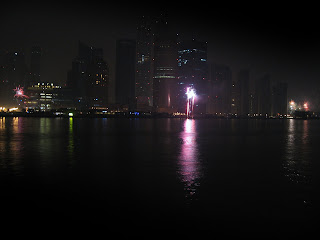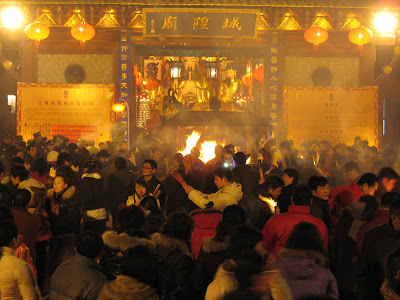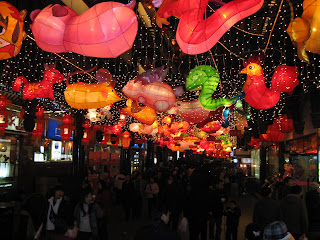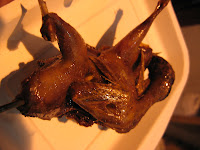Sunt, aşadar, în China. Mai exact, în Shanghai. Un orăşel în plină dezvoltare, cu 18 milioane de locuitori în estul Chinei, port fluvial şi maritim. Se spune că în Shanghai se experimentează ceea ce se va aplica mai apoi restului Chinei. De exemplu, prima întâlnire a Partidului Comunist Chinez a avut loc aici. Acum, capitalismul intră în China tot prin Shanghai, şi, ca să vezi!, şi eu tot în Shanghai iau contact cu pământul chinez.
Ce caut eu aici? Această întrebare mi se învârte şi mie prin minte din când în când. O alung repede cu un răspuns oficial: îmi finalizez cei doi ani de master printr-o lucrare de diplomă realizată la Universitatea Jiao Tong din Shanghai. Încă am nişte dubii în legătură cu CE este lucrarea mea de diplomă, dar asta nu e o informaţie oficială.

Am sosit în Shanghai pe 5 februarie, după 11 ore de zbor. Plăcut, dar lung. Nu am experimentat niciodată jet lagging-ul până acum. Cele 7 ore diferenţă între Praga şi Shanghai au fost (şi încă sunt!) o încercare, dacă nu dificilă, cel puţin frustrantă. Problema apare când e vorba de activităţile.. “plăcute”, cum ar fi mâncarea şi somnul. În cazul celor două, corpul meu se comport pavlovian atât în ceea ce priveşte ceasul cât şi perioadele zilei. Numai că ceasul respectat de el este merge pe ora Europei Centrale, iar perioadele zilei sunt, incredibil!, reglate după ora Sganghai-ului. Aşadar, mă culc, normal, la câteva ore după apusul soarelui în Shanghai, şi mă trezesc, normal, 14 ore mai târziu, la câteva ore după răsăritul soarelui în Praga. Mănânc micul dejun de Shanghai, apoi prânzul de Shanghai urmat de micul dejun de Praga şi un pic mai târziu prânzul de Praga simultan cu cina de Shanghai. În final, bineînţeles, cina de Praga.
Închei prima intrare de jurnal cu prima impresie pe care mi-a făcut-o China: producţie în masă. În timp ce scriu aceste rânduri îmi dau seama că ideea de unicat a cam dispărut de aici. Fiecare 100 de metri pe drumul dintre aeroport şi centrul oraşului copiază 90% din cei 100 de metri precedenţi. Clădiri (marea majoritate blocuri de locuit), şosea, vegetaţie, poduri, cale ferată, tot… Tot mai puţin scrisul…
Mi-am propus să învăţ cinci caractere chinezeşti pe zi. Preferatul de azi este
字-“caracter scris”. Se pare că pentru chinezi manuscrisele erau atât de preţioase încât trebuia să te comporţi cu ele ca şi cum ar fi fost cópii neajutoraţi. Caracterul de mai sus e compus din “copil” şi “acoperiş”.
---
I am in China. To be more precise, Shanghai. A coastal town in full development with its 18 million inhabitants (that’s about the population of Romania, minus the guys left to work in Germany, Italy, Spain and other brighter countries). It is said that Shanghai experiments what will be later applied to all China. The first Chinese Communist Party took place here. Now the Capitalism flows through it into China. And so do I.
What am I doing here? This question troubles me from time to time but I put it on the run with an official answer: I finish my master studies with a diploma paper done in the Shanghai Jiao Tong University. I still have some questions on WHAT exactly is its subject, but that’s unofficial information.
I arrived on the 5 th of February, after 11 hours of pleasant, long, flight. My first jet lagging experience proves to be quite a challenge. The 7 hours difference between Prague and Shanghai turned out to be quite difficult to cope with for my body. It has its pavlovian reactions to time and daylight. The problem is that their clock is set on CET while the daylight is a bit more to the East. That creates some disturbances, especially in the more pleasant activities, such as eating and sleeping. I go to sleep a few hours after the Shanghai sunset, and wake up, 14 hours later, short after the Prague dawn. I have my Shanghai breakfast and lunch, followed by Prague breakfast. I have simultaneously my Shanghai dinner and Prague lunch. And, just before going to sleep, my Prague dinner.

I end my first log with my first impression of China: mass production. I noticed that “unique” tends to disappear from Chinese dictionaries. Every hundred meters between the airport and the city center copies 90% of the previous hundred. Buildings, road, vegetation, bridges, railroad (the famous magnetic levitation train), everything… Except the writing.
I promised myself that I will learn five Chinese characters each day. I’ll choose one for each log. The one for today is
字 – “written character”. The Chinese praised so much their writings that thought of protecting them like children. Thus, the “written character” character is made out of a “child” and a “roof”.
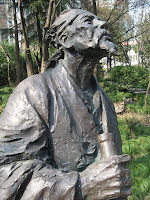 demn premergător al Plug-ului în China, a scris un tratat de agronomie uriaş (Wiki zice că peste 700.000 de caractere chinezeşti). În timpul liber a tradus în chineză “Elementele” lui Euclid, s-a convertit la catolicism ajutat de un prieten iezuit şi s-a ocupat cu birocraţia imperiului ca Ministru.
demn premergător al Plug-ului în China, a scris un tratat de agronomie uriaş (Wiki zice că peste 700.000 de caractere chinezeşti). În timpul liber a tradus în chineză “Elementele” lui Euclid, s-a convertit la catolicism ajutat de un prieten iezuit şi s-a ocupat cu birocraţia imperiului ca Ministru. 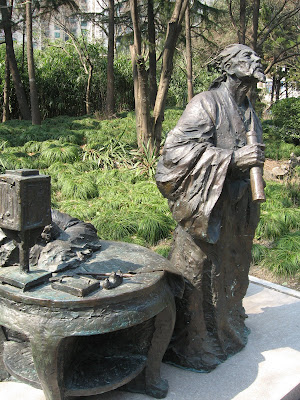 Un zâmbet uşor înfloreşte pe faţa trasă şi încadrată de barba tunsă în stil european. Doar privindu-i statuia, nu poate să nu-ţi placă de Xu. Jos pălăria şi respectele mele domnului sculptor.
Un zâmbet uşor înfloreşte pe faţa trasă şi încadrată de barba tunsă în stil european. Doar privindu-i statuia, nu poate să nu-ţi placă de Xu. Jos pălăria şi respectele mele domnului sculptor.